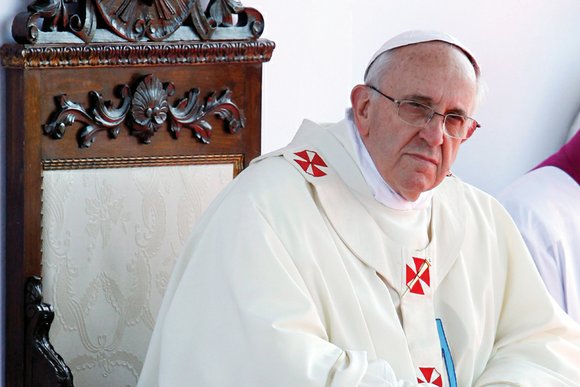Pope Francis a stranger to the U.S. in many ways
Associated Press | 9/11/2015, 12:51 a.m.
By Rachel Zoll
New York
When Pope Francis sets foot on the tarmac at Andrews Air Force Base near Washington on Sept. 22, it won’t just be his first time in the United States as pontiff. It will be his first time in the country — ever in his life.
The former Cardinal Jorge Mario Bergoglio of Buenos Aires, Argentina, never followed the footsteps of so many fellow Roman Catholic leaders of his rank, who sought to raise their profiles, along with funds for missions back home, by networking within the deeply influential and well-resourced U.S. church.
This gap in his resume can be explained in part by Pope Francis’ personality. He was a homebody who loathed being away and felt a profound obligation to stay near the people of his archdiocese. He also famously opposed ladder-climbing, condemning what he called “airport bishops” who spend more time traveling for their own prestige or pleasure than serving their flock.
Still, Pope Francis’ lack of firsthand experience of the U.S. stands out for many, especially those struggling to absorb his unsparing critique of the excesses of global capitalism and wondering whether this first Latin American pope harbors resentment over the history of U.S. policies in his native region.
“This trip to the United States will be the most difficult, the most challenging, and the most interesting because he’s exploring a world that for him is more foreign than Asia, than the Philippines,” where Pope Francis traveled last January, said Massimo Faggioli, an expert in church history at the University of St. Thomas in Minnesota. “It’s not just a language barrier. It’s a cultural barrier.”
The pope’s introduction to the United States will begin in Washington, where he will meet with President Obama at the White House on Sept. 23, address a joint meeting of Congress on Sept. 24, followed by an address Sept. 25 to the U.N. General Assembly in New York, and outdoor Mass on Sept. 27 at the World Meeting of Families in Philadelphia.
But he will start the journey earlier and somewhere much more familiar — in Cuba, where from Sept. 19 to 22, he will mark the country’s new era with the United States, then travel directly here.
“Francis’ heart is in the Third World and the Global South, but he has a way of proclaiming the Gospel that’s very attractive to people in the United States,” said the Rev. Thomas Reese, a senior analyst with the National Catholic Reporter newspaper and author of “Inside the Vatican.”
“I think there will be an overwhelming response from the American people to him. I think they will be charmed by him.”
Bishop Marcelo Sanchez Sorondo, an Argentine and one of Pope Francis’ key advisers at the Vatican, said he was aware of but disputed the perception that the pope disliked the United States. The pope’s view that a global economic system focused on maximizing profits was destroying the poor and the environment has landed hard in a country considered the world headquarters for capitalism.
Bishop Sanchez Sorondo insisted Pope Francis is not anti-capitalist and said the pope admires America for the principles of the Founding Fathers, who influenced the independence movement in his native Argentina. But the pope’s outlook also is shaped by another history, including U.S. ties with Latin American dictators, America’s treatment of Mexican and Central American immigrants, and longstanding U.S. policy toward Cuba, the bishop said. Pope Francis recently helped negotiate a historic thaw in U.S.-Cuba relations that has led to restored diplomatic ties between the countries.







